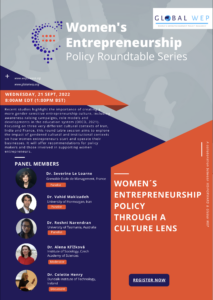
- This event has passed.
WEI Global Institute Entrepreneurship Policy Roundtables Women’s Entrepreneurship Policy Through a Culture Lens 21 September, 2022.
21 September, 2022

The WEI Global Institute (WGI) collaborates with partners, such as the Global Women’s Entrepreneurship Policy Research Network (Global WEP), to engage academics, policy makers, private sector, and key stakeholders. The virtual roundtables aim to identify and address issues & solutions, share lessons, and advocate for changes necessary to advance gender economic equity.
Our inaugural 2022 series is co-sponsored by the WGI and the Global WEP.
Join us on September 21 for the second in a series of three roundtables on Women’s Entrepreneurship Policy Through a Culture Lens. To join us, register here: bit.ly/3RAiqph

The myth of under-performance, negative attitudes towards women entrepreneurs, lower credibility and limited access to funding for women as well as disproportionate responsibilities for unpaid care-work represent important cultural barriers for women’s entrepreneurship (Jurik, 2020; Marlow & McAdam, 2013; OECD, 2021; Yousafzai, Fayolle, et al., 2018). Entrepreneurship policies and policies focused specifically on women’s entrepreneurship support are embedded in particular cultural contexts. Also ,employment policies, family and tax policies are gendered and embedded in the cultural context limiting or enhancing women’s entrepreneurship potential (Welter, 2011). It is important to analyze contexts in how they shape women’s entrepreneurial activities at transnational, national and regional level, and to recognize and dismantle culturally embedded barriers to entrepreneurship practice and to access to support policies and look for examples of how female entrepreneurs through their endeavors modify these contexts (Yousafzai, Lindgreen, Saeed, Henry, & Fayolle, 2018).
Recent studies highlight the importance of creating a more gender-sensitive entrepreneurship culture, including awareness raising campaigns, role models and developments in the education system (OECD, 2021). Focusing on three very different cultural contexts of Iran, India and France, this roundtable session aims to explore the impact of gendered cultural and institutional contexts on how women entrepreneurs start and operate their businesses. It will offer recommendations for policy makers and those involved in supporting women entrepreneurs.
Chair/Moderator
Alena Křížková, Institute of Sociology, Czech Academy of Sciences
Panel Members
Roshni Narendran, University of Tasmania, Australia
Vahid Makizadeh, University of Hormozgan, Iran
Severine Le Loarne, Grenoble Ecole de Management, France
Discussants
Colette Henry, Dundalk Institute of Technology, Ireland and Griffith University, Australia
Join us to engage in the discussion and to discuss positive solutions towards making entrepreneurial spaces gender-just.
